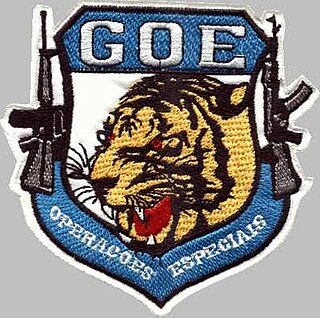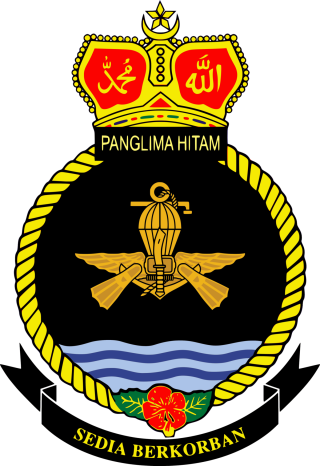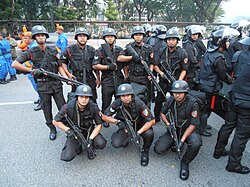
The Hostage Rescue Team (HRT) is the Federal Bureau of Investigation's (FBI) elite tactical unit. The HRT was formed to provide a full-time federal law enforcement tactical capability to respond to major terrorist incidents throughout the United States. Today, the HRT performs a number of tactical law enforcement and national security functions in high-risk environments and conditions and has deployed overseas, including with military Joint Special Operations Command units.

The Gruppo di Intervento Speciale (GIS) is the special forces unit of the Carabinieri. The Carabinieri, a branch of the Italian Armed Forces responsible for both military and civil policing, formed GIS in 1978 as a police tactical unit. In 2004, GIS assumed a special operations role, evolving to a special forces unit, in addition to the police tactical unit role, becoming part of the Comando interforze per le Operazioni delle Forze Speciali (COFS.

The Special Task Force (STF) is the elite police tactical unit of the South African Police Service (SAPS). The Special Task Force handles high risk operations that fall beyond the scope of classic policing which require specialised skills.
Special Emergency Response Team (SERT) is the Police Tactical Group of the Queensland Police Service (QPS) and also provides a high angle rescue response. SERT provides the QPS with the ability to respond to high risk situations incidents statewide. SERT is based in Brisbane and Cairns to ensure that specialists capabilities are available to support police at any location in Queensland.
The Security Operations Group (SOG) is a unit of elite corrections officers of Corrective Services NSW, Australia formerly known as the Hostage Response Group (HRG).

Pasukan Gerakan Khas is a special operations command of the Royal Malaysia Police (RMP). The PGK has two distinct sub-units; the Special Actions Unit and the 69 Commando Battalion.

The Emergency Response Unit (ERU) is the police tactical unit of the Garda Síochána, Ireland's national police and security service. The unit was a section of the forces' Special Detective Unit (SDU), under the Crime and Security Branch (CSB) until 2017, when the Special Tactics and Operational Command was created to take over its operational duties alongside Armed Support Units.

Gerak Khas, or Grup Gerak Khas, also spelled Gerakhas, is a Malaysian Army special forces unit that performs special operations missions such as direct action, unconventional warfare, sabotage, counter-terrorism, and intelligence gathering. Gerak Khas was founded in 1965 during the Indonesia-Malaysia conflict, and they gained worldwide fame and recognition after successfully pacifying the communist insurgency in Malaysia's jungles between 1968 and 1989.

The Special Actions Detachment or DAE is the tier one special force maritime unit of the Portuguese Navy. It is part of the Portuguese Marine Corps. Raised in 1985, the DAE is one of the smallest special forces units within the Portuguese Armed Forces. It is responsible for conducting air-sea rescue, amphibious reconnaissance, amphibious warfare, black operation, bomb disposal, CBRN defense, coastal raiding, counterterrorism, direct action, executive protection, hostage rescue, irregular warfare, ISTAR, long-range penetration, JTAC, manhunt high-value target, maritime sabotage, mountain rescue, naval boarding, operation behind high risk enemy lines, special operations, special reconnaissance, tracking targets, underwater demolition, unconventional warfare, other missions in support of Portuguese and NATO armed forces. DAE's mission and training are similar to American special forces and it often trains with them.

A correctional emergency response team is a team of specially trained prison officers tasked with responding to disturbances, riots, cell extractions, mass searches, and other situations in prisons that are likely to involve uncooperative or violent prisoners.
Special Operations Response Teams are a group under the US Federal Bureau of Prisons, or BOP for short, a component of the US Department of Justice (DOJ). The BOP is responsible for maintaining the custody of anyone convicted of committing a federal crime. To achieve this goal, the BOP maintains a number of correctional facilities, which are divided into six regions, throughout the US. These facilities house approximately 211,195 inmates of varying security levels. Facilities are designated as either minimum, medium, maximum, or the most recent addition, super max.

The Grupo de Operações Especiais, mostly known by its acronym GOE, was the police tactical unit of the Civil Police of the state of São Paulo, Brazil. It was comparable to Rio de Janeiro's CORE. In 2019, the Governor of the State of São Paulo, João Dória, extinguished the group and its members were moved to the newly created Department of Strategic Police Operations.
The Unit Tindakan Cepat in Malay are the special response units of the Royal Malaysia Police. Based at all police contingent headquarters in Malaysia, UTC are full-time units whose members do not perform any other duties, and are essentially the equivalent of American SWAT teams. They are units of the Criminal Investigations Department. They are also called upon to respond first to any counter-terrorist action, before the arrival of Pasukan Gerakan Khas reinforcements.
The Singapore Prisons Emergency Action Response (SPEAR) is a department within the Singapore Prison Service (SPS).
Arintaraj 26 is the tier 1 police tactical unit of the Royal Thai Police (RTP).

The Pasukan Khas Laut, commonly abbreviated to PASKAL, is the principal special operations force of the Royal Malaysian Navy.
The National Special Operations Force (NSOF) has been Malaysia's main security force which serves as the first responder to any terror threats on the country's sovereignty after October 2016. The force covers elements from the Malaysian Armed Forces, Royal Malaysia Police and the Malaysian Maritime Enforcement Agency.
The 69 Commando ; also known as Very Able Troopers 69 is an elite multi-tasking special forces unit of the Royal Malaysia Police. The VAT 69 is based at Ulu Kinta, Perak and together with Special Actions Unit, they are part of Pasukan Gerakan Khas. The mission of 69 Commando is to conduct high-risk tasks such as counter-terrorism, hostage rescue, intelligence gathering and counter-insurgency within the borders of Malaysia.

The Special Actions Unit, commonly known as and abbreviated to UTK is a tactical unit of the Royal Malaysia Police (RMP). The unit is headquartered at the RMP buildings in Bukit Aman, Kuala Lumpur. Together with the 69 Commando, they form the Pasukan Gerakan Khas.
The Special Forces and Elite Forces include both a specially and higher trained unit and a small percentage of personnel from a specific Malaysian military branch, law enforcement or government agency. In Malaysia, the term 'Special Forces' is widely used by uniformed services for special forces, special operations forces and 'special' trained units while 'Elite Forces' for units that more trained and capable combat. Regular personnel must undertake specialized and higher training to be able to join the units of the 'Special and Elite Forces'. These "Special Elite Forces" are denoted by different beret colours, shoulder tabs, unit patches, skill badges and uniforms.












